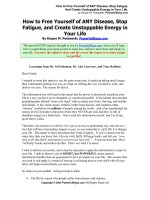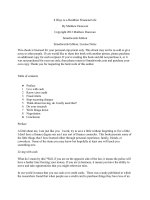8 Ways to Great: Peak Performance on the Job and in Your Life pps
Bạn đang xem bản rút gọn của tài liệu. Xem và tải ngay bản đầy đủ của tài liệu tại đây (551.24 KB, 126 trang )
8
to
-
PEAK PERFORMANCE ON THE JOB AND IN YOUR LIFE
WAYS
GREAT
DR. DOUG HIRSCHHORN
8
WAYS
to
GREAT
G. P. PUTNAM’S S ONS
New York
8
to
-
PEAK PERFORMANCE ON THE JOB AND IN YOUR LIFE
WAYS
GREAT
DR. DOUG HIRSCHHORN
G. P. PUTNAM’S SONS
Publishers Since 1838
Published by the Penguin Group
Penguin Group (USA) Inc., 375 Hudson Street, New York, New York 10014,
USA
• Penguin Group (Canada), 90 Eglinton Avenue East, Suite 700,
Toronto, Ontario M4P 2Y3, Canada (a division of Pearson Penguin Canada
Inc.)
• Penguin Books Ltd, 80 Strand, London WC2R 0RL, England •
Penguin Ireland, 25 St Stephen’s Green, Dublin 2, Ireland
(a division of Penguin Books Ltd)
• Penguin Group (Australia),
250 Camberwell Road, Camberwell, Victoria 3124, Australia
(a division of Pearson Australia Group Pty Ltd)
•
Penguin Books India Pvt Ltd, 11 Community Centre, Panchsheel Park,
New Delhi–110 017, India
• Penguin Group (NZ), 67 Apollo Drive, Rosedale,
North Shore 0632, New Zealand (a division of Pearson New Zealand Ltd)
• Penguin Books (South Africa) (Pty) Ltd, 24 Sturdee Avenue, Rosebank,
Johannesburg 2196, South Africa
Penguin Books Ltd, Registered Offices:
80 Strand, London WC2R 0RL, England
Copyright © 2010 by Edge Consulting LLC
All rights reserved. No part of this book may be reproduced, scanned, or
distributed in any printed or electronic form without permission. Please do
not participate in or encourage piracy of copyrighted materials in violation of
the author’s rights. Purchase only authorized editions.
Published simultaneously in Canada
Library of Congress Cataloging-in-Publication Data
Hirschhorn, Doug.
8 ways to great: peak performance on the job and in your life /
Doug Hirschhorn.
p. cm.
ISBN: 1-101-16250-3
1. Success in business. 2. Employees—Coaching of. I. Title.
II. Title: 8 ways to great.
HF5386.H617 2010 2009023797
658.3'124—dc22
BOOK DESIGN BY AMANDA DEWEY
C.H.A.M.P.
®
is a registered trademark of Douglas K. Hirschhorn.
Dr. Doug Hirschhorn’s expertise is in the psychology of achieving peak
performance. Dr. Doug Hirschhorn is not a financial adviser and does not make
trading or investment recommendations or provide trading or investment advice.
He is an expert on the mental game. Although Doug Hirschhorn has a Ph.D. in
psychology with a specialization in sport psychology, he is not a licensed
psychologist and does not provide therapeutic, clinical, or counseling services.
While the author has made every effort to provide accurate telephone numbers
and Internet addresses at the time of publication, neither the publisher nor the
author assumes any responsibility for errors, or for changes that occur after
publication. Further, the publisher does not have any control over and does not
assume any responsibility for author or third-party websites or their content.
To my wife, Amy.
Contents
-
why the 8 principles are going to help
you
principle #1. find your “why?” 7
principle #2. get to know yourself
principle #7. get comfortable with being
18
principle #3. learn to love the process 29
principle #4. sharpen your edge 44
principle #5. be all that
you
can be 59
principle #6. keep your cool 72
uncomfortable
84
principle #8. make yourself accountable 93
the 8 principles at a glance 109
Acknowledgments 113
1
8
WAYS
to
GREAT
Why the 8 Principles
Are Going to Help
You
-
Y
ou’re smart and you want to be smarter, you’re good and you
want to be better, but you don’t really understand why the kind
of advice I give to elite traders or hedge fund managers can possibly
have meaning for you. What does their business have to do with
yours? Don’t they operate in an entirely different ballpark? And
aren’t these the same guys who blew up and lost billions of dollars
in the most recent stock market meltdown?
The answers to those questions are both yes and no. Yes, top trad-
ers are probably handling much larger sums of money than you on a
daily basis, and yes, many of them did lose a lot of money when the
market went into free fall. But no, not all of them blew up, and not all
of them are crooks. Some of them (those who happen to be my clients)
are coming straight through the eye of the storm with the same high
level of integrity they have always had, and while their ship may be
beaten up a little, it is still very much intact and sailing strong.
1
8 WAYS to GREAT
More important, however, this book isn’t about how to invest and
make millions in the stock market. I leave that to the countless oth
-
ers who choose to write about some system or strategy they’ve found
for making money in the markets. This book is about how super
-
successful people think. Because how they think is the key to how
well they do. And the big news is that you can learn to think that
way, too.
True success begins with a state of mind. But it takes specific
actions and behaviors to move from intentions into action and get
results. The eight principles outlined in this book are those used by
all top performers in every field of endeavor—be it sports, business,
politics, education, or anything else they choose to pursue.
I know this because my own career took several twists and turns
before I found myself working with mega-traders as a peak perfor
-
mance coach. I started out as a clerk on the floor of the Chicago
Mercantile Exchange and then eventually became a trader on the
floor of the Chicago Board of Trade. When I left trading after three
years because a herniated disc in my lower back made it incredibly
painful for me to stand all day on the trading floor, I was sort of at
loose ends—as we all are from time to time. My contemporaries were
graduating from law schools, medical schools, or MBA programs and
already building their careers, and I felt like the loser who had just
wasted three years of my life. My work experience as a floor trader is
not really a transferable skill in the real-world job market. I had no
idea what I was going to do next, but I thought about being a baseball
coach because I’d played Division 1 baseball when I was a student
at Colgate University. The only problem with that career path was
2
Why the 8 Principles Are Going to Help Yo u
that I found out I’d need a master’s degree if I wanted to coach on the
college level. I wasn’t thrilled with the idea of having to go back to
school, but when I found out about the field of sport psychology I
was intrigued enough to pursue it. My rationale was that since the
commissioner of baseball at the time was a lawyer by training, I could
certainly be a baseball coach with a degree in sport psychology. I
knew it would be a long time before I made much money, but if I’d
learned one lesson on the trading floor, it was that money can come
and go very quickly, and, in the end, if you don’t love what you do you
won’t be successful over time.
While I was still in graduate school I was offered an internship
with the University of Connecticut baseball team. It was while I was
working with the members of that team as a sport psychology con
-
sultant that the lightbulb went on. I realized that everything I was
doing to coach a slumping batter out of his funk I could have used
to coach myself when I was trading and bummed out because I was
losing money. The psychology was exactly the same. Once I figured
that out, I knew I was onto something: the difference between being
a winner and being a loser has at least as much (if not more) to do
with mental attitude as it does with your particular skills.
That’s when I put together the proposal for my first book,
The Trading Athlete, and started to make a name for myself as the
first person with trading experience and a degree in sport psychology
to apply that knowledge to improving performance in the trading
world.
Since then, in addition to coaching my clients one-on-one, I’ve
conducted hundreds of workshops for thousands of people working
in financial institutions, multibillion-dollar hedge funds, and corpo
-
rations across the country. I do a weekly video blog for CNBC and
3
8 WAYS to GREAT
have appeared on the Today show, CNBC’s Fast Money, Squawk on
the Street, The Call, Power Lunch, Street Signs, Closing Bell, On the
Money, The Big Idea with Donny Deutsch, Millionaire Inside, and
many other programs, as well as on VH1’s The Fabulous Life. And in
each of my workshops as well as on television I’ve discussed the
principles I’ll now be teaching you.
The point is that I didn’t teach baseball players how to hit the
ball, and I don’t teach my clients how to invest. Those are skills they
already have. What I coach them on is how to think so that they can
do what they already do well even better. And with this book, I
can do the same for you.
This doesn’t mean that if you’re tone deaf I can teach you to sing
opera; I can’t. I am not a magician. I don’t create talent; I simply
help people to achieve their own potential. But if you have a great
operatic voice and you want to take your career to the next level, the
skills I teach in this book will help you to do that—so long as you’re
willing to commit to the program and walk the walk. The people I
work with are already extremely good at what they do. But they
aren’t happy with just being A- players. They want to get an A+ and
they’ll commit to doing whatever it takes to get to that level. In that
respect they’re like bodybuilders who, to the layman’s eye, look as if
they have a perfect physique but who see room for improvement in
themselves, even if it is just losing that last one-quarter percent of
body fat. And because they see the opportunity, they are compelled
to make the mental, physical, and personal sacrifices required to
achieve that level of excellence.
For my clients, being good enough just isn’t good enough; they
want to be the best. It’s not my job to advise them on seeking more
balance in their lives or help them deal with their personal relation
-
4
Why the 8 Principles Are Going to Help Yo u
ship issues. That’s the work of a life coach or even a therapist. I am
not a life coach, I am not a therapist, and I am not a licensed psy
-
chologist. I am a peak performance coach who is hired to help the
elite identify areas for improvement, map out a plan of action, and
then hold them accountable so they can achieve it.
The interesting thing is that, in most respects, these high fliers
aren’t any different from the rest of us. They’re all flawed human
beings, just like you and me—in some cases even more so. The one
thing that does set them apart is that they’ve learned to think differ
-
ently from most people. You can learn to think the way they do; it
isn’t magic—you’ve just got to want it badly enough to stop making
decisions that are based on pure emotion or instinct and start to
stick to your game plan, even when it’s the last thing you want to do.
(In fact, that’s when you need to stick to it the most.) Then you need
to get comfortable with the idea that you will be uncomfortable at
times and will be taking risks—although, if you follow the rules I’m
going to lay out for you and stick with the plan, they will always be
smart, calculated risks.
I’m not saying that every decision you make is going to turn out
exactly as you’d planned; that simply isn’t realistic, and even the
most successful traders know they’re not going to make money on
every trade. I’m not saying that you’ll never make a mistake; what I
am saying is that you won’t be making any more stupid, avoidable
mistakes.
The people I work with on a daily basis are the Tiger Woodses,
Roger Federers, and Jackie Joyner-Kersees of the trading world. Con
-
fidentiality prevents me from disclosing their names or identifying
their companies, but I can assure you that they are the ones who
have been around for years and not only survived but even thrived
5
8 WAYS to GREAT
during the global financial meltdown of 2008 and 2009. They are the
stars that shine brightest in the trading universe, and I’m going to let
you in on how they think. Make no mistake: It isn’t their superior
mathematical skills or their extraordinary good luck that’s gotten
them where they are. It’s their thinking that makes them remarkable
and solidifies their place in the supertraders’ hall of fame.
So, welcome to the inner circle. The door is unlocked. All you
have to do is gather the courage and determination to walk through
it and use what you are about to learn.
Note to Readers
In order to avoid the awkwardness of having to write “he or she”
or, even more awkward, “s/he” throughout the book, I’ve taken the
liberty of using the male pronoun throughout the book. I ask all
female readers to forgive me.
6
Principle #1
Find Your “Why?”
-
A person who has a why can deal with any how.
—FRIEDRICH NIETZSCHE
D
arren is one of my first and most successful clients. I met
him years ago when I was doing a workshop at a hedge fund.
At the end of the session Darren approached me and introduced
himself.
“I liked your presentation,” he said. “I want to be great.”
Now, this was a pretty sloppy-looking guy. His shirttail was un-
tucked, he needed a haircut, and it didn’t look as if he’d shaved that
morning. But I knew better than to equate grooming elegance with
success, especially in the trading world, so I asked him the same two
questions I ask all my clients: “Why have you chosen to trade for a
living?” and “Why do you want to be great?”
“What are you talking about? Why wouldn’t I want to be great?”
he shot back, looking somewhat annoyed.
“Well,” I persisted. “You already make a ton of money, so why do
7
8 WAYS to GREAT
you want to get to the next level? What’s the point?” I was baiting
him, but he had a ready response.
“Because I can. Because it’s there to be achieved.”
I knew Darren believed that, but I wanted to know more; I
wanted him to dig deeper. We all know that greatness is there to be
achieved, but not all of us are motivated or willing to take the risks
to achieve it. So I kept on questioning.
As we continued to talk, it became clear that he thrived on the
excitement, the fact that there were always new challenges, and the
satisfaction of playing the game and solving the puzzle. He told
me that when he was growing up, no one had expected him to
amount to very much and he wanted to prove to himself that they
were wrong. He understood that the business he was in was a mer
-
itocracy in which the upside was unlimited and no one else could
determine his worth or limit his success.
By the end of our conversation I knew Darren was well on his
way to greatness. He’d already taken the first step by identifying
his “why,” or what I call his core motivation. It was not a question
of whether he had good reasons or bad reasons. All that mattered
was that he had reasons for doing what he was choosing to do for a
living.
Most people would assume that for high-flying traders like Dar-
ren, the motivation is all about money, but that is flat-out untrue. In
fact, I’ve never had a trader tell me he was doing it only for the
money. Most of my clients are so rich that if it were only about
the money they could easily have retired years ago and still have
amassed generation-changing wealth to pass on to their children.
But, in fact, they’re still trading. So it’s not for the money. They do
8
Principle #1: Find Your “Why?”
it for the excitement, the challenge, for the satisfaction of figuring
the odds and making decisions with imperfect information. They
love the game. They like to win. If they could make even more
money in some other job than they do trading and were given the
choice, they’d pick trading every time.
You’ll be hearing more about Darren as you read on, and you’ll
also be meeting other mega-traders who’ve found their way to great
by using these eight principles to unlock their potential.
I’m assuming that because you’re reading this book, you, too,
want to do better at “something” and you’re curious to know how
these mega-successful traders do it. You might even doubt that what
works for them will work for you, but it will. In truth, it doesn’t really
matter what your “something” is because the first step is always to
ask yourself why you’re doing what you do. If you don’t understand
your core motivation, you won’t know what’s driving your engine,
which means that you won’t know what buttons to push to rev up
the power you need to get to the next level.
Stop Asking Yourself “How?”
The reason most people go through life with big dreams but fail
to achieve them is because they ask themselves “how” before they
know their “why.”
How am I going to grow this business?
How am I going to get that promotion?
How can I become a more effective salesperson?
How can I increase my income?
9
8 WAYS to GREAT
Those questions aren’t very different from asking yourself:
How am I going to lose twenty pounds?
How am I going to find the time to go to the gym?
How am I going to get everything done that I need to do today,
tomorrow, this week, this month?
What happens when you ask yourself those “how” questions? Do
you feel more energized and determined, or do you begin to worry
and fear that you can’t or won’t be successful? I’m betting it’s the
latter, because “how” is a question that’s bound to bring up negative
feelings. Instead of getting you excited, it leaves you deflated, with
the result that you may decide not even to try. If I’ve just described
the way you think, don’t worry, because Principle #6 is going to teach
you how to get past your fears and emotions so that you can put your
“why” to work and improve your performance. But first you need to
figure out what your “why” really is.
What’s Your Why?
Maybe you can come up with an answer to the question of why
you do what you do right off the bat:
I’m a marketing executive because I really get a kick out of figuring
out what will influence people to buy one particular product
rather than a competing one.
I’m a financial adviser because I like helping people plan ways to
create financial security for their families’ future.
10
Principle #1: Find Your “Why?”
I’m an entrepreneur because I love the process of taking a concept
from my head and turning it into a money-generating business.
I’m a news reporter because I really enjoy being on the front line of
global events and I get a real charge out of people’s depending
on me for information.
I work at a coffee shop because I like to meet new people all day
long and really enjoy seeing the smiles on my customers’ faces
when they smell and taste that fresh, hot cup of joe I brewed
especially for them.
I’m a teacher because it’s so gratifying to see the light in my stu-
dents’ eyes when they learn something new and I know that I’ve
just created lasting growth in a young person’s life.
As for me, I’m a peak performance coach because I love helping
people to unlock their abilities so that they can achieve greatness in
their performance.
If you are able to identify your “why” immediately, that’s great.
You’re reading this book because you want to do what you love more
effectively. But not everyone can answer so definitively or so quickly.
Maybe you really don’t know why you’re walking this particular
path. Maybe you’ve never really thought about it before—I know that
Darren, the client I told you about earlier, never had until I asked
him. Or maybe you knew once upon a time when you started out,
but now it’s hard to remember because somewhere along the way you
got distracted and lost focus. In today’s world that’s very easy to do.
At the height of the economic meltdown of 2008, Darren (under-
standably) was not very happy, and asking questions like “How did
this happen?” and “How are we going to turn things around in the
11
8 WAYS to GREAT
next few months?” I reminded him that when we first started work-
ing together, I had asked him what motivated him as a trader. By this
time, Darren’s business had grown exponentially. He employed more
than seventy-five people, and instead of the $30 million he was trad
-
ing when I first met him, his fund now managed several billions of
dollars.
“You asked me that?” He seemed surprised.
“Yup,” I replied. “Five years ago I asked you why you wanted to
get to the next level.”
“And what did I say?”
“You said you wanted to be the best you could be because you
loved the challenge and excitement, you loved playing the game and
solving the puzzle.”
“I did?”
“Yes,” I repeated. “And in the midst of everything that’s been going
on around you—the market volatility, the fact that you’re losing money
right now—you temporarily lost your focus and have been asking
“how” questions. You forgot why you were doing this in the first place.
The challenge is still there, and more than ever there are puzzles to
be solved. You just need to get back in touch with your ‘why.’”
Even the most motivated and successful trader can get so caught
up in the daily drama that he forgets this core concept. If you’re hav
-
ing a hard time remembering why you got where you are in the first
place, you need to take a step back and remind yourself of why you’re
doing whatever it is that you do. I tell my clients to write down this
simple question—“Why am I doing this for a living?”—and then go
home and think about it. I’ve never met one who couldn’t come up
with an answer. Sometimes their initial response is to say they do it
for the money, but because I know that really isn’t the whole story, I
12
Principle #1: Find Your “Why?”
tell them they haven’t really thought hard enough. They need to dig
deeper. When they do that, they come up with the real answers: They
do it for the excitement, for the challenge, because they like to win.
They do it because no one else determines how much they’re worth
or puts limits on how much they can make. They are the masters of
their own destiny. That is the real reason behind their true “why.”
Try it yourself. Write down these two questions:
• Why have I chosen to (do whatever it is that you do)?
• Why am I still doing it?
Don’t answer right away. Really think about it. Remember, your
“why” is ultimately what’s going to get you from where you are now
to where you want to be.
It’s quite possible that this simple exercise is all you need to re-
capture your old passion. But there is still another possibility. It
could be that you’re doing what you do simply because you fell into
it or because you inherited a family business and took the path of
least resistance. Maybe you really hate what you’re doing but just
don’t know how to start doing something else.
Does your answer sound like one of these?
• I am a teacher because my mother always said it was a good
career and I get the summers to myself.
• I am a marketing executive because the money is good; I’ve
been in marketing since my first job out of college; this is
the only thing I know how to do.
•
I’m a government employee because I know I have job
security.
13









